James Stuart is a passionate home cook turned chef who has been obsessed with ramen for over a decade. Let down by what was available in the UK, he set out on an adventure to create his own. In the crucible of lockdown, he spent months making and eating ramen multiple times per day, using local ingredients and traditional techniques.
Fuelled by obsessive internet research and exchanges with ramen legends online, he began creating new styles and recreating classic ones. After multiple sell-out popups at West Street Kitchen and collaborations with great ramen chefs from around the country, James set up his own ramen shop for the people of Bristol to enjoy.
Hi James. Tell us the background story behind Tomo No Ramen?
So, I was actually working an office job at the time and was pretty starved of any creative outlet. I started out in the industry by selling Sichuan style chilli oil at Farmers Markets and went on to start selling it to local businesses, including Bristol based West Street Kitchen. The owners Nathan and Millie decided to close for a while to celebrate their wedding and it was at that point,
I decided I was going to do a pop-up kitchen. It was around that time that I was really getting into ramen; I was getting a lot of ramen books translated and watching a lot of YouTube videos to learn more about the technical aspects of the cuisine.
Anyway, just as I was preparing to do the pop-up, Covid hit. I was incredibly lucky as it ended up becoming a period of intense research, and I know for a fact I wouldn’t have been able to put out a product that was is as good as it is had it not been for that time.
When did the first pop-up happen?
We did the first pop-up on 15th August 2020 and then did a few more – mostly in West Street -Kitchen – but also one in Cardiff with Matsudai Ramen and New Wave Ramen in Manchester. It was really cool to work in different environments and get that experience behind me.
Thanks to Instagram I was able to instantly connect with people whose work I thought was cool and talk to people who I wouldn’t otherwise have had the opportunity to meet.
James Chant of Matsudai Ramen was instrumental in getting us ready for launch even though he was very busy with his own pop-up. Luckily, I had my dad on hand to do most of the maintenance and building work, he put in new lighting, a new bar and really brought the place back up to spec. The week before opening was the most tired and stressed I’ve ever been in my life.
What was the opening like?
We had eight days turn around after the soft launch and we initially opened as a collaboration with Matsudai Ramen. They sent one of their chefs down once a week to cook their dishes and having their oversight on proceedings was really useful.
Staffing was surprisingly easy; hiring front of house staff was the hardest part because it’s hard to source people who want to commit to part time roles. The team are incredible though and we wouldn’t have been able to do it without them coming in and committing themselves to the restaurant fully.
It’s been really cool introducing people who may have been experienced chefs but had never really experimented with ramen before to the tricks of the trade. Tony – one of our chefs – just created a jerk chicken ramen which is absolutely banging! It’s these types of dishes that I can’t wait for people to discover.
What do you love about ramen?
I’ve loved ramen for a long time. I first started making it myself at home back in 2012 because there really was nothing in the way of ramen food establishments in Bristol then. I remember going on a trip to London for a Banksy exhibition back in 2010 and someone recommended that the one thing I did was go to Shoryu Ramen. That was the first time I tried proper ramen and I absolutely loved it. It wasn’t an easy dish to choose to do. The most basic definition of ramen is that it’s alkaline wheat noodles in soup, so when you go by that, there’s a lot of space for creativity.
The soup can be anything from a light aromatic broth to something creamy and full of umami. Then there’s the noodles – they can be straight, fine, hard, thick, thin, literally the possibilities
are endless. The toppings are a whole other bag – you can do pretty much whatever you want to add protein to the mix. It’s got to be one of the most versatile dishes out there! It started as a fusion food between Chinese and Japanese cuisine. In fact, in Japan they actually class it as Chinese food. You get a lot of fusion food in Japan – things like spiced ramen cooked by Hindu chefs.They do amazing miso ramen, and whilst I was there, I came across a shop that was pineapple themed; there’s so much creativity going on over there in their cooking and I really respect that. There’s more to ramen than just your classic Tonkotsu. At the restaurant, we have between 3-6 dishes on the menu at any one time because we want to keep it interesting for not only customers, but ourselves as well. It’s important that we keep creating and keep pushing the boundaries on what ramen should be.
For that reason, it’s only natural we change our menu a lot, especially when we bring in new team members who all have their own spin on how ramen should look and taste. Our team member Jake is vegetarian and so he created a special dish for people who follow a plant-based diet which actually led to some really interesting discoveries.
Being able to get input from people with different areas of interests and apply that to what we’re doing has been absolutely terrific because we’re able to take an idea and run with it. The restaurant is only five months old, but we are constantly reviving how we do things.
Bristol has a huge amount of vegetarians and vegans so this has encouraged us to be more creative when we’re planning a new menu. In fact, we actually had some people from Bristol 24/7 eat at the restaurant not long ago who were both vegetarian and they loved it – we got a glowing review as a result in The Bristol Post / Bristol Live. Not bad considering we managed to open the restaurant for just £24k, including the lease purchase costs.
Where do you source your ingredients?
We get plenty of ingredients from Japan, but they’re not produced in volumes that would be viable for us to use regularly. Our tofu is made in the UK, and we try and use local suppliers wherever possible. Costs have gone up rapidly in the last two months and it’s going to get to a point soon where we’re forced to adjust our prices slightly. I think people will understand but it’s just choosing the right moment to do it.
What do you love most about your job?
I feel like I’m utilising my skills more fully than in any other job and I hope this comes across in what we’re doing. I haven’t been able to express myself in such a public way before which is great and getting genuine feedback from customers is just as meaningful as a review, if not more, sometimes.
What do you love about the independent food scene?
We have people who come in every week; in fact, we have one regular who used to live in the building behind the restaurant who comes in lots on his own or
with friends.Old Market is full of great independents and there’s a real community spirit. I think the one thing that really came through during the pandemic was people’s willingness to support independents – we were really lucky to have that support from people in Bristol.
I’m so happy I made the leap into setting up my own business. It’s incredibly difficult – it quickly went from being just me to suddenly having eight people who are relying on me to keep a roof over their heads. Running a restaurant is like being the captain of a ship, you need every one of them to make it work but ultimately, you are the one steering the ship.
What advice would you give to those thinking of starting up?
Surround yourself with really strong people beforehand, make sure you have a support network because you’re going to need it. I was stubborn in the beginning and didn’t want to take help from people – luckily my friends pushed me through this and helped anyway.
What are you most looking forward to this year?
I’m excited to see how the team develops. I also want to introduce more complex elements to the specials menu and get the food to a level we can be incredibly proud of.




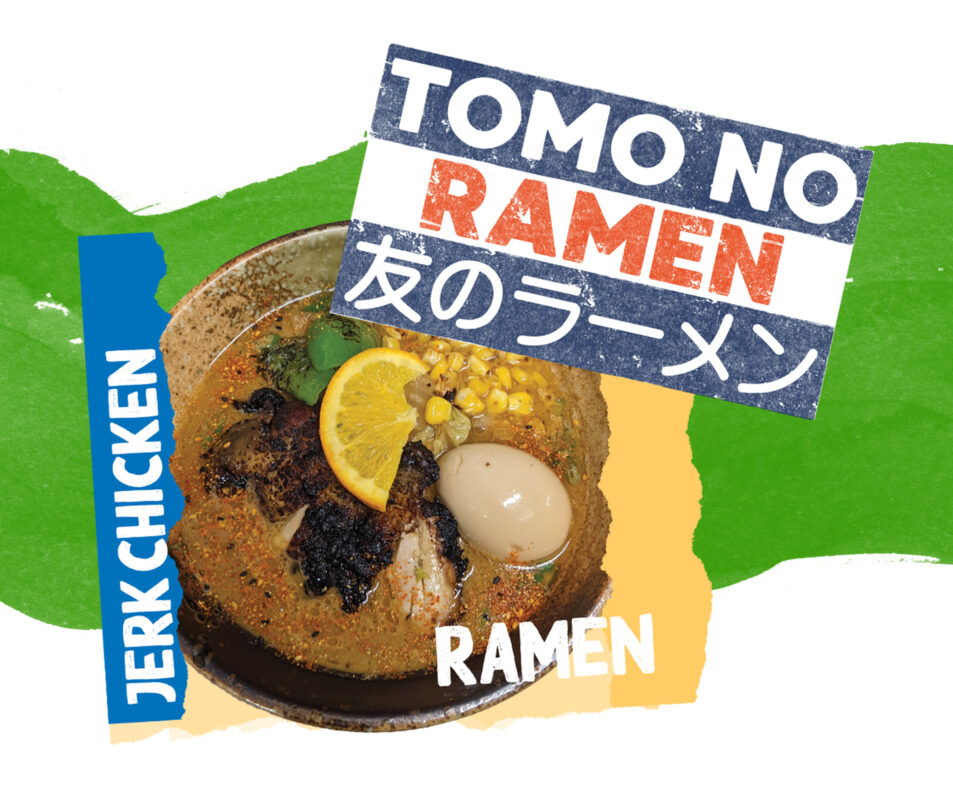
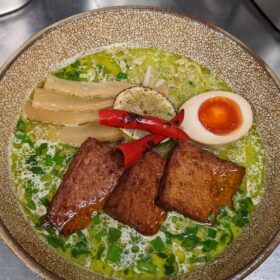
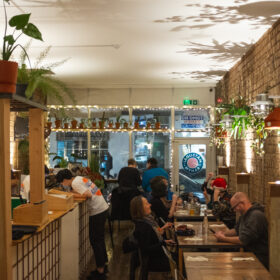
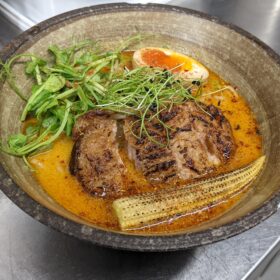
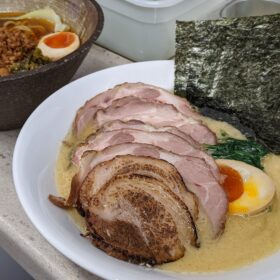
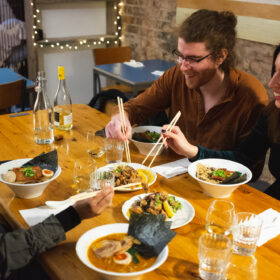
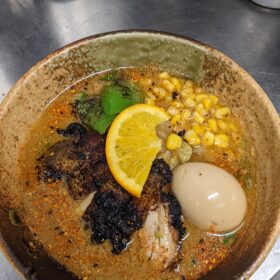

 Featured Training
Featured Training
OUR MEMBERSHIP
We're here to help make your catering business a success. Whether that be starting up or getting on top of your compliance and marketing. We're here to help you succeed.
Want our latest content?
Subscribe to our mailing list and get weekly insights, resources and articles for free
Get the emails